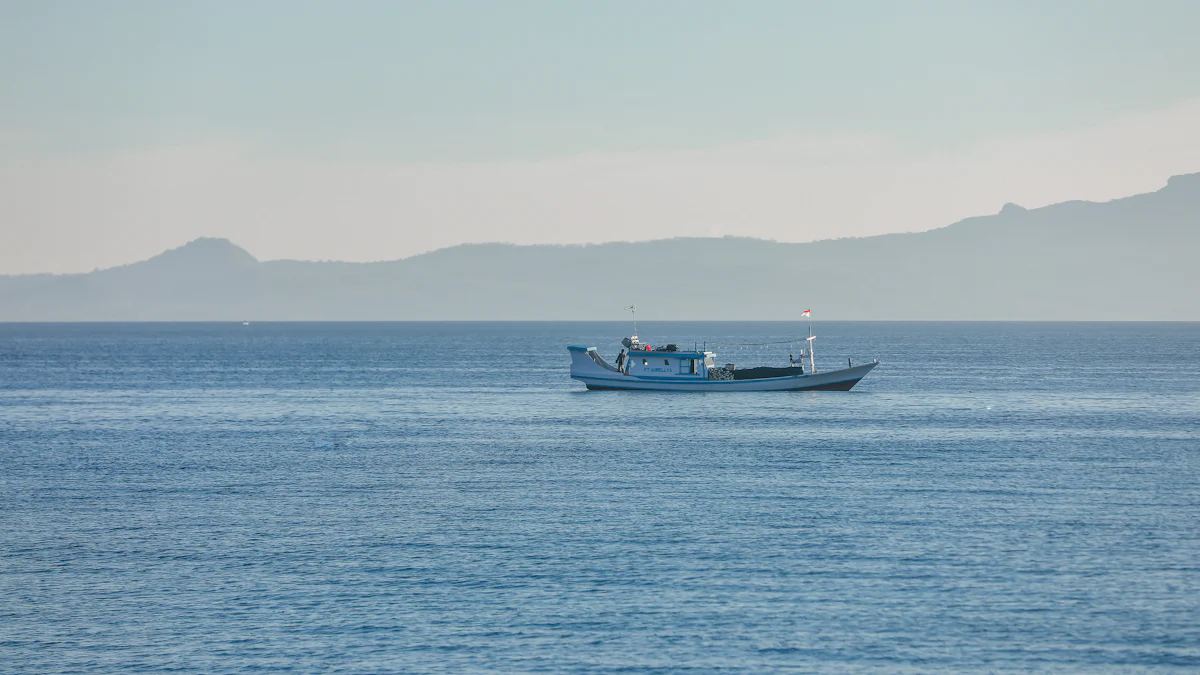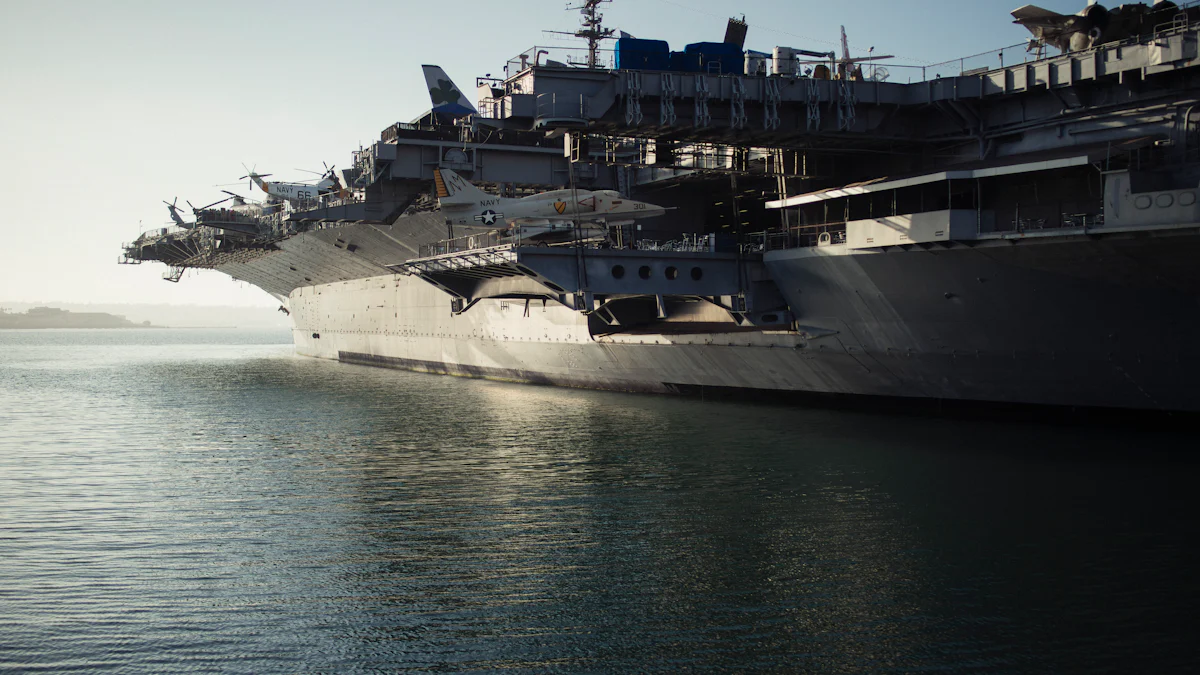Key Terms in Maritime Law Everyone Should Know

Understanding key terms in Maritime Law is essential for anyone involved in maritime activities. Maritime Law governs the vast open seas, which cover about 70% of the earth's surface. This legal framework, overseen by the International Maritime Organization (IMO), ensures the safety, security, and environmental performance of shipping.
Whether you're a seafarer, shipowner, or part of the maritime industry, knowing these key terms in Maritime Law helps you navigate your legal rights and responsibilities effectively. The impact of these terms extends to individuals and businesses, influencing operations and compliance in this vital sector. Consulting a Maritime Lawyer can provide further clarity and guidance in understanding and applying these legal principles.
The Jones Act
Definition and Purpose
The Jones Act, officially known as the Merchant Marine Act of 1920, plays a crucial role in maritime law. This legislation primarily aims to protect seamen by allowing them to seek compensation for injuries sustained while working. If you work at sea and suffer an injury due to your employer's negligence, the Jones Act empowers you to sue for damages. This act not only safeguards your rights but also ensures that maritime employers maintain safe working conditions.
Moreover, the Jones Act supports the U.S. Merchant Marine, which is vital for the country's economic security and national defense. It mandates that cargo transported between U.S. ports must be carried on vessels that are U.S.-built, U.S.-owned, and registered under the U.S. flag. This requirement strengthens the domestic shipping industry and ensures a robust fleet ready for national emergencies.
Implications for Maritime Workers
For maritime workers like you, the Jones Act provides significant protections. It ensures that if you get injured while performing your duties, you have the right to claim damages from your employer. This legal provision is essential because it holds employers accountable for maintaining a safe working environment. However, it's important to note that not all maritime workers qualify as Jones Act seamen. To be eligible, you must spend a substantial amount of your work time on a vessel in navigation.
The act also distinguishes between seamen and other maritime workers, such as guest passengers or volunteers, who do not have the same rights under the Jones Act. Understanding these distinctions is crucial for knowing your rights and responsibilities at sea. By familiarizing yourself with the Jones Act, you can better navigate the legal landscape of maritime employment and ensure your safety and well-being while working on the water.
Maintenance and Cure
Explanation of the Principle
In maritime law, the principle of Maintenance and Cure plays a vital role in safeguarding the well-being of seamen like you. This doctrine obligates shipowners to provide for your basic living expenses and medical care if you suffer an injury or illness while serving on a vessel. Unlike other compensation laws, Maintenance and Cure benefits apply regardless of who is at fault for the injury. This means that even if your injury was not due to negligence, you still have the right to receive these benefits.
Maintenance refers to the daily living expenses you need while recovering from an injury. This includes costs for food, shelter, and other necessities. Cure, on the other hand, covers the medical expenses required for your treatment until you reach maximum medical recovery. This comprehensive support ensures that you can focus on healing without the added stress of financial burdens.
Impact on Seamen
For you as a seaman, the impact of Maintenance and Cure is significant. This legal provision ensures that you receive necessary support during your recovery period. It acts as a safety net, providing financial assistance and medical care when you need it most. The courts have even extended these benefits to cover injuries incurred on land, as long as they are related to your maritime duties.
Receiving Maintenance and Cure benefits can make a substantial difference in your life. It provides an income supplement, helping you maintain a stable living situation while you recover. Additionally, it covers your medical expenses, ensuring you have access to the care you need. This support is crucial in helping you return to work healthy and ready to perform your duties effectively.
Understanding your rights under the Maintenance and Cure doctrine empowers you to seek the benefits you deserve. By familiarizing yourself with this principle, you can better navigate the complexities of maritime law and ensure your well-being while working at sea.
Longshore and Harbor Workers’ Compensation Act
Overview of the Act
The Longshore and Harbor Workers’ Compensation Act (LHWCA) serves as a crucial piece of federal maritime legislation. It provides essential benefits to maritime workers who are not classified as seamen. If you work as a longshoreman, harbor worker, or in similar maritime roles, this act ensures you receive compensation for injuries sustained during employment. The LHWCA covers medical benefits, compensation for lost wages, and rehabilitation services. In unfortunate cases where a work-related injury results in death, the act also provides survivor benefits to your dependents.
This law extends its coverage to various maritime occupations, including shipbuilders and ship repairers. Additionally, extensions of the LHWCA, such as the Outer Continental Shelf Lands Act (OCSLA), broaden the scope to include workers on oil rigs and other offshore installations. By understanding the LHWCA, you can better navigate your rights and protections within the maritime industry.
Differences from Other Compensation Laws
The LHWCA differs from other compensation laws, such as the Jones Act, in several key ways. While the Jones Act specifically protects seamen, the LHWCA focuses on maritime workers who do not qualify as seamen. This distinction is important because it determines the type of benefits and legal recourse available to you in case of an injury.
Unlike state workers' compensation laws, the LHWCA operates at the federal level, providing uniform benefits across the United States. This federal oversight ensures that you receive consistent protection regardless of where you work along the coast. Moreover, the LHWCA offers comprehensive coverage, including medical care and rehabilitation services, which may not be as extensive under state laws.
Understanding these differences helps you identify the appropriate legal framework for your situation. By familiarizing yourself with the LHWCA, you can ensure that you receive the benefits and support you deserve as a maritime worker.
Admiralty Jurisdiction
Definition and Scope
Admiralty jurisdiction, also known as maritime jurisdiction, refers to the authority of courts to hear and decide cases related to maritime activities. This jurisdiction covers a wide range of issues, including contracts, torts, injuries, and offenses that occur on navigable waters. You will find that admiralty jurisdiction extends to all waters used for commercial navigation, ensuring that maritime commerce operates smoothly and fairly.
The scope of admiralty jurisdiction is broad. It includes cases arising from accidents on navigable waters, such as collisions between vessels or injuries to maritime workers. This jurisdiction also covers disputes over shipping contracts, salvage operations, and marine insurance claims. By understanding the scope of admiralty jurisdiction, you can better navigate the legal landscape of maritime activities and ensure compliance with relevant laws.
Impact on Legal Proceedings
Admiralty jurisdiction significantly impacts legal proceedings involving maritime matters. When a case falls under this jurisdiction, it is typically handled by specialized courts with expertise in maritime law. These courts apply unique legal principles and procedures tailored to the complexities of maritime activities. As a result, you can expect a more informed and efficient resolution of maritime disputes.
The involvement of maritime commerce in legal proceedings under admiralty jurisdiction ensures that the interests of all parties are considered. For example, when a collision occurs between two vessels, the court will assess liability based on maritime law principles, such as the rules of navigation and seaworthiness. This approach helps maintain fairness and consistency in resolving maritime disputes.
Moreover, admiralty jurisdiction plays a crucial role in protecting the rights of maritime workers. If you suffer an injury while working on a vessel, you can seek compensation through the courts under this jurisdiction. The specialized knowledge of maritime law possessed by these courts ensures that your case is handled with the expertise it deserves.
Understanding admiralty jurisdiction empowers you to navigate the legal aspects of maritime activities effectively. By familiarizing yourself with its definition and scope, you can better protect your rights and interests in the maritime industry.
Salvage Rights

Understanding Salvage Law
In maritime law, salvage rights play a crucial role in rewarding those who assist in recovering ships or cargo in distress at sea. When you help save another person's vessel or cargo from peril, you become entitled to a reward. This reward reflects the value of the property you saved. The principle of "no cure, no pay" governs salvage operations. This means you only receive compensation if your efforts successfully save the property.
The International Convention on Salvage of 1989 expanded the scope of salvage. It now includes environmental protection as part of salvage operations. This means that when you engage in salvage activities, you not only help save property but also contribute to protecting the marine environment. Your actions can prevent potential environmental disasters, making your role even more significant.
Legal Implications
Salvage rights come with specific legal implications. When you perform a successful salvage operation, you can enforce your claim for a reward both in personam (against the person) and in rem (against the property). This means you can hold the ship or its sister ship in lien to secure your claim. If the parties involved cannot agree on the reward amount, a court will determine it. The court considers the value of the property saved and the effort and danger you faced during the salvage operation.
Different types of salvage agreements exist. Some involve a pre-agreed amount or percentage, while others do not. If you enter a salvage operation without a pre-agreed reward, the court will assess the situation post-salvage. The court's decision ensures fairness and recognizes the risks you took to save the property.
Understanding salvage rights empowers you to engage in maritime assistance confidently. By knowing the legal framework and potential rewards, you can make informed decisions when participating in salvage operations. Your efforts not only help save valuable property but also contribute to the safety and sustainability of maritime activities.
Maritime Liens

Definition and Purpose
In maritime law, a maritime lien serves as a powerful legal tool. It provides you with a claim against a vessel for debts related to the ship. This lien ensures that if someone owes you money for services or goods provided to a vessel, you have a right to seek compensation directly from the vessel itself. Maritime liens arise automatically by operation of law, without the need for a contract or agreement.
The primary purpose of a maritime lien is to secure payment for services rendered or damages incurred. For example, if you supply fuel to a ship, a maritime lien ensures you can claim payment even if the shipowner defaults. This legal mechanism protects your interests and ensures fairness in maritime commerce. Maritime liens cover a wide range of claims, including unpaid wages, repairs, and salvage operations.
Impact on Maritime Transactions
Maritime liens significantly impact transactions involving ships. When you engage in maritime commerce, understanding these liens becomes crucial. They affect the buying, selling, and financing of vessels. A vessel with outstanding liens may face legal challenges, complicating its sale or transfer. As a buyer, you must ensure that the vessel is free of liens to avoid unexpected liabilities.
In the context of maritime mortgages, liens play a vital role. They provide security to lenders by ensuring that their loans are protected against the vessel. If the borrower defaults, the lender can enforce the lien to recover the debt. This framework offers a level of assurance in maritime financial transactions.
To navigate maritime transactions effectively, you should conduct thorough due diligence. Investigate any existing liens on a vessel before finalizing a deal. This step helps you avoid potential legal disputes and financial losses. By understanding maritime liens, you can make informed decisions and protect your interests in the complex world of maritime commerce.
Limitation of Liability
Explanation of the Concept
In maritime law, the Limitation of Liability concept allows shipowners to limit their financial responsibility for certain incidents. This principle stems from the Limitation of Liability Act, which entitles you, as a shipowner, to limit liability if you were unaware of any unseaworthiness or negligence that led to an incident. The act originally aimed to protect shipowners in the 19th century, ensuring they could continue operations without facing crippling financial losses from unforeseen events.
The limitation often involves setting a maximum liability cap, which can be a fixed dollar amount. This cap helps manage risks and liabilities, providing predictability in maritime operations. By understanding this concept, you can better navigate the complexities of maritime law and protect your interests in the industry.
Implications for Shipowners
For you as a shipowner, the implications of the Limitation of Liability are significant. This legal provision offers a safety net, allowing you to limit financial exposure in cases of accidents, injuries, or cargo loss. However, you must ensure that you meet specific conditions to invoke this limitation. You need to demonstrate that you were unaware of any issues that contributed to the incident, such as the vessel's unseaworthiness.
The act also requires you to bring the limitation to the attention of your customers and ensure equal bargaining power in contracts. Writing these provisions in plain language and setting reasonable liability limits are crucial steps. By doing so, you can maintain transparency and fairness in your business dealings.
Understanding the Limitation of Liability empowers you to manage risks effectively. By familiarizing yourself with this concept, you can safeguard your operations and ensure compliance with maritime law. This knowledge not only protects your financial interests but also contributes to the stability and sustainability of the maritime industry.
Understanding key maritime law terms is crucial for anyone involved in maritime activities. These terms shape your rights and responsibilities, ensuring you navigate the legal waters effectively. Consulting a Maritime Lawyer can provide you with specific legal advice tailored to your needs. Their expertise in maritime laws and regulations offers invaluable insights into complex legal matters. Maritime law remains vital in global trade and commerce, influencing operations worldwide. As you engage in maritime activities, staying informed about these laws ensures compliance and promotes safe, efficient maritime operations.





